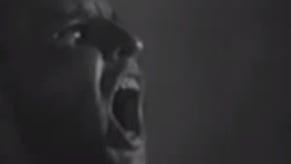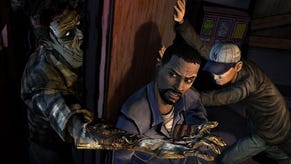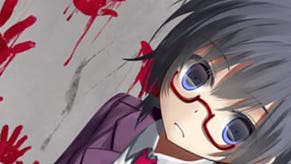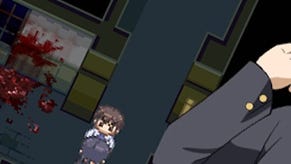The Fear of Losing Handheld Horror Games
With the genre on the decline, why are horror games on our portable systems more important than ever? Gaming’s masters of fear give their take on the issue.
This article first appeared on USgamer, a partner publication of VG247. Some content, such as this article, has been migrated to VG247 for posterity after USgamer's closure - but it has not been edited or further vetted by the VG247 team.
I make a run for the alleyway, its potent mixture of rot and decay should hide my scent from these...well, I'm not sure what they are. I'm heading somewhere, and while I can't think of an exact location, it's definitely away from here. I stick to the shadows, avoiding the filth at my feet. As if it even matters anymore. The monsters shamble past, as I squeeze the letter my dead wife left me, one that she managed to send from beyond the grave. I think I'm alone, but there's hot air hitting my neck now...and I think I'm a goner.
I look up and I'm surrounded, but not by zombies. I'm joined by a different shuffling mass, composed of nurses, factory workers, and writers. The warm breath on my neck was from the college student sitting next to me. My Vita may be in my hands now, but just a moment ago I was in its world. That's the beauty of handhelds; I can bring them everywhere, and they can take me anywhere.
The home is a communal area, there's children running about, and dogs barking at every passerby. It's not the ideal situation for a horror game, not by a long shot. Sure, we can shut off the lights, but how long can that last? Just where will I be in Raccoon City when my wife wants to watch last week's Game of Thrones again? Handhelds change the definition of play space. Suddenly, I'm not restricted to the couch. I can head upstairs, outside, wherever I need to go for some afternoon terrors. That freedom is what makes horror games on handhelds better than any living room could offer, more frightening than a crowded movie theater. I can dictate my experience, perhaps even making the fear more real as I play on the back porch with a storm brewing overhead.
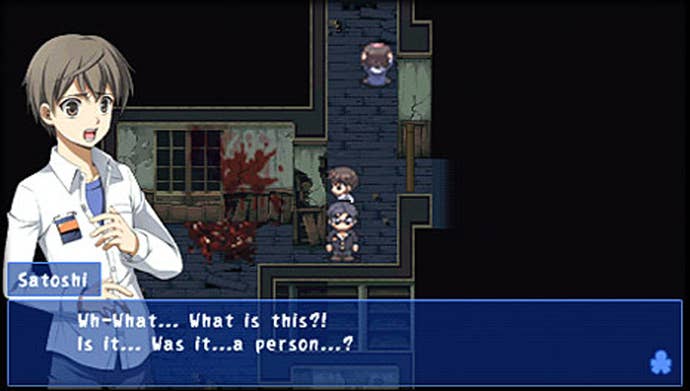
Unfortunately, horror games are a rare breed on handhelds, despite the efforts of those willing to take the chance. Novels, films, and photographs can all instill fear, and yet there remains the belief that our pint sized consoles can't be the root of that same sense of dread. Portables are able to add to the genre in ways that are impossible for our PS4s and PCs, proving that not everything comes down to power. It's funny that considering the monsters that populate horror games, a publisher's greatest fear about these works is the idea of bringing them to handhelds.
Jools Watsham, co-founder of Renegade Kid, knows this handheld phobia firsthand from the studio's pursuits of a publisher for Dementium: The Ward. Watsham and his studio had crafted this survival horror game for the DS, but despite its impressive engine and haunting atmosphere, the work was rejected at every turn. Watsham says no one was willing to put faith in a Mature rated title for a platform as "family-friendly" as the Nintendo DS.
It's odd how so many have systems like the 3DS pinned down as devices for children. Low cost hardware and hit software like Pokémon inspires publishers to think that adults can't be in possession of these portables. But as a father of two, handhelds are nearly the only way I can find the time to play. I deserve to see just as diverse a library as I could find anywhere else. But I suppose that's the catch, if no one makes horror games for handhelds, no one can buy them, and if no one can buy them, the audience can't expand.
Effectiveness of horror on a handheld is in the eye of the beholder, and if you’re open and willing to allow yourself to be whisked away into a world of make-believe, it will be all the more enjoyable for you. - Jools Watsham
While Renegade Kid was able to sign a deal with Gamecock Media Group for the game’s release in 2007, the trouble with the horror genre on handhelds doesn't end at demographics.
"I think the survival horror genre has always been a tough sell to publishers," Watsham tells me, "because it is a smaller, more specialized audience." In an effort to expand this audience, we've seen the genre's largest proponents morph into a shell of their former selves. Resident Evil, once known for its limiting save system and elusive ammunition, has tailored itself to an audience more familiar with the non-stop action found in titles like Call of Duty. With publishers unwilling to develop what Watsham describes as "an authentic horror experience", the likelihood of the genre appearing on handhelds becomes even slimmer. "If you then further reduce the potential audience by choosing a single platform, and a handheld one at that," Watsham explains, "most publishers simply don't want to take the risk for fear of not making a profit on their financial investment."
If the horror genre is on the outs as a whole, just why is its appearance on handhelds so important? While playing in the dark with a pair of headphones is possible no matter your platform, the ability to take your 3DS and Vita with you anywhere is the defining factor. Whether it be to a quieter room, or to work and back, there doesn’t have to be any down time. For as much as we love to play, playing exclusively at home can be limiting. To truly get the most out of our day, handhelds can take up any moment of free time. Best of all, I can grab hold of my PSP and take it somewhere that leaves me more vulnerable. I can heighten the experience by any means possible.
Tom Lipschultz, localization specialist at XSEED Games, is aware of how far players can go to achieve that perfect scenario. Lipschultz worked on the PSP title Corpse Party and its sequel, Book of Shadows, two games whose looks may betray you. The bubbly high school students that make up its cast only serve to make its disgusting moments all the worse. Death is never a simple affair here, and most are expressed through nothing more than text and audio. Lipschultz relays an anecdote about Tomokazu Sugita, a voice actor for Corpse Party: Book of Shadows. Before indulging his fears with a trip to Kisaragi Academy, Sugita places his PSP in a watertight baggie, turns off all the lights, and soaks in a tub full of dyed-red water. A bit extreme, but as Lipschultz puts it, "portables require a little more effort from the player." Many gamers won't go these lengths, but any attempt to strengthen the experience is encouraged.
Playing a game like Corpse Party "wouldn't be half as scary if you were playing it in broad daylight with the sound outputting through the PSP speakers," Lipschultz tells me. He's right, for as possible as it is for us to play in the scariest of places, we can also free ourselves of any stress by escaping to a less threatening setting. Rob Clarke, PR and Marketing Manager at Curve Studios, says they had concerns in bringing Lone Survivor to the Vita. "There was some nervousness that people wouldn't be able to get into it as much on a portable device," Clarke admits. Curve felt that Lone Survivor's grungy 2D visuals worked well on the Vita, but more importantly, "it doesn't rely on jumps scares or...cheap tactics to scare the players." This means that even in small doses, like between bus stops, Lone Survivor's world and sense of dread can seep into you. "It's a story about madness and isolation that uses a lot of dialogue," Clarke advises, "and while the art style is absolutely vital to the game, it's not about making the player 'scared' in the same way that...Outlast or Amnesia might be."
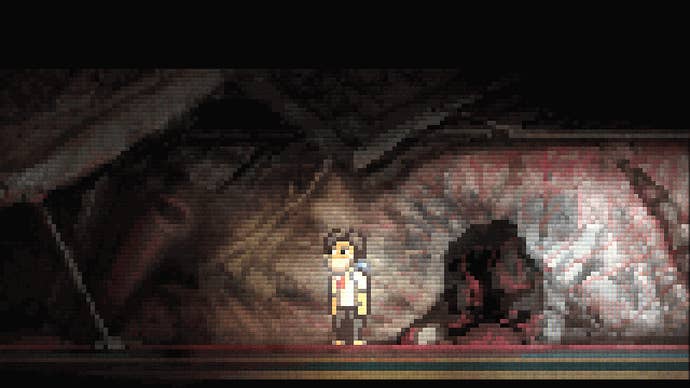
What all this means is that for as much work a developer puts into the title, players need to commit as well. But the result will speak for itself when you're out on the back porch with no lamp to turn on when the fear sets in. "You can really change people's mood towards the game depending on where the are," says Benjamin Rivers, "the great thing about handhelds is that they make it easy to do so." Rivers' game, Home, has players make their way to that titular residence, deciding just how the amnesiac protagonist remembers what happens next. Home is currently available on Steam and iOS, with a release for the PS4 and Vita penned for later this year, and Rivers says he's been told of players taking his game into “the woods and other creepy places” and will continue to encourage players to do so and post the results to Instagram. Watsham too knows he has a receptive audience, as Dementium: The Ward has inspired players to write to his studio, sharing their "joyful fears" as he puts it. For Watsham, that kind of response proves that “a handheld can indeed be an effective home for a scary experience.”
Taking this into consideration, just how do developers create a proper horror game for the handheld market? To Lipschultz, not dumbing it down is most important. "It's all about just making sure the game is actually good," Lipschultz declares, "Too often, you'll see developers scale their games back for handheld systems." He says that developers decide to craft "bite-sized" games, and for Lipschultz, this flies in the face of his want for for a game "every bit as long and involved as something I'd play on the PC." Just because our Vita isn't as strong as the PlayStation 4, Lipschultz insists that "the gameplay doesn't have to be scaled back to match."
Watsham says to do away with any preconceived notion of what a handheld can or cannot do, “the size of the screen and the realism depicted is not what makes a scary game scary.” So while games like Corpse Party and Lone Survivor aren’t throwing thousands of polygons at you, that doesn’t mean they’re any less valid. “Effectiveness of horror on a handheld is in the eye of the beholder," Watsham notes, "and if you’re open and willing to allow yourself to be whisked away into a world of make-believe, it will be all the more enjoyable for you.”
With the independent community picking up the slack, we’re seeing the genre come back in big ways. As nice as it is to sit on my couch and be plagued by visions of Pyramid Head's misdeeds, things are not so simple with every member of the household wanting to make use of that same television (and probably have the lights back on). Handhelds let us escape, sometimes even literally. I find it easier to get sucked into a portable game’s world, with the screen just inches away from my face, and a pool of blood red water around me.

